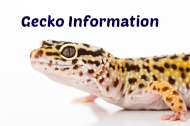
|
Habitat - Geckos need a clean roomy cage, fresh water, and a temperature of 80F to 90F. Avoid sand bedding, corncob bedding, walnut bedding, bark and moss bedding. Newspaper or paper towels is the safest choice. Strive for a humidity of approximately 40-60%. Provide a shallow water dish and a moist hide area, but make sure the remainder of the habitat is dry.
Offer geckos hiding places to provide security. Also provide full spectrum lighting during the day. Change your UVA/UVB light every 6 months for optimal absorption. Offer rocks and logs as climbing structures for exercise. Diet - They eat insects such as crickets, mealworms and wax worms. Dust insects with calcium powder containing D3. Incorrect diets result in metabolic bone problems. Other - Geckos will lose their tails to escape from predators or if scared. Veterinary Care - Geckos need to see the vet 1-2 times per year for examinations, fecal checks and sometimes other diagnostics. Geckos may get intestinal blockages from eating bedding or mealworms that are too large. Fatal perforations can result from eating mealworms alive. Moldy crickets can cause liver toxicity. Gecko’s may have internal parasites or external ones like mites.
Remember to always wash your hands after handling any animal, especially reptiles and amphibians. See information from the CDC about reptiles and contagious salmonella infections.
|



